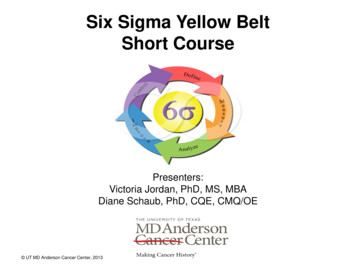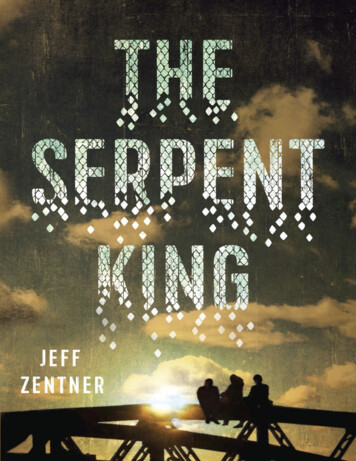
Transcription
The King in YellowChambers, Robert WilliamPublished: 1895Categorie(s): Fiction, Horror, Short StoriesSource: http://gutenberg.org1
About Chambers:Robert William Chambers (May 26, 1865 – December 16,1933) was an American artist and writer. He was born inBrooklyn, New York, to William P. Chambers (1827 - 1911), afamous lawyer, and Caroline Chambers (née Boughton), a direct descendant of Roger Williams, the founder of Providence,Rhode Island. Robert's brother was Walter Boughton Chambers, the world famous architect. Robert was first educated atthe the Brooklyn Polytechnic Institute,and then entered the ArtStudents' League at around the age of twenty, where the artistCharles Dana Gibson was his fellow student. Chambers studiedat the École des Beaux-Arts, and at Académie Julian, in Parisfrom 1886 to 1893, and his work was displayed at the Salon asearly as 1889. On his return to New York, he succeeded inselling his illustrations to Life, Truth, and Vogue magazines.Then, for reasons unclear, he devoted his time to writing, producing his first novel, In the Quarter (written in 1887 in Munich ) . His most famous, and perhaps most meritorious, effortis The King in Yellow, a collection of weird fiction short stories,connected by the theme of a book (to which the title refers)which drives those who read it insane. Chambers' fictitiousdrama The King in Yellow features in Karl Edward Wagner'sstory "The River of Night's Dreaming", while James Blish'sstory "More Light" purports to include much of the actual textof the play. Chambers later turned to writing romantic fictionto earn a living. According to some estimates, Chambers wasone of the most successful literary careers of his period, hislater novels selling well and a handful achieving best-sellerstatus. Many of his works were also serialized in magazines.After 1924 he devoted himself solely to writing Historical fiction . On July 12, 1898, he married Elsa Vaughn Moller(1882-1939). They had a son, Robert Edward Stuart Chambers(later calling himself Robert Husted Chambers) who alsogained some fame as an author. H. P. Lovecraft said of him in aletter to Clark Ashton Smith, "Chambers is like Rupert Hughesand a few other fallen Titans - equipped with the right brainsand education but wholly out of the habit of using them." Frederic Taber Cooper commented, "So much of Chambers's workexasperates, because we feel that he might so easily havemade it better." He died in New York on December 16th 1933.2
A critical essay on Chambers' work appears in S. T. Joshi'sbook The Evolution of the Weird Tale (2004). Source:WikipediaAlso available on Feedbooks for Chambers:The Hidden Children (1914)The Dark Star (1916)Between Friends (1914)In Search of the Unknown (1904)In Secret (1919)The Green Mouse (1910)The Slayer of Souls (1920)Police!!! (1915)Ailsa Paige (1910)The Fighting Chance (1906)Copyright: This work is available for countries where copyright is Life 70 and in the USA.Note: This book is brought to you by Feedbookshttp://www.feedbooks.comStrictly for personal use, do not use this file for commercialpurposes.3
Along the shore the cloud waves break, The twin sunssink beneath the lake, The shadows lengthen In Carcosa.Strange is the night where black stars rise, And strangemoons circle through the skies But stranger still is LostCarcosa.Songs that the Hyades shall sing, Where flap the tattersof the King, Must die unheard in Dim Carcosa.Song of my soul, my voice is dead; Die thou, unsung, astears unshed Shall dry and die in Lost Carcosa.Cassilda's Song in "The King in Yellow," Act i, Scene 2.4
Part 1The Repairer of Reputations5
Chapter1"Ne raillons pas les fous; leur folie dure plus longtemps que lanôtre . Voila toute la différence."Toward the end of the year 1920 the Government of the United States had practically completed the programme, adoptedduring the last months of President Winthrop's administration.The country was apparently tranquil. Everybody knows howthe Tariff and Labour questions were settled. The war withGermany, incident on that country's seizure of the Samoan Islands, had left no visible scars upon the republic, and the temporary occupation of Norfolk by the invading army had beenforgotten in the joy over repeated naval victories, and the subsequent ridiculous plight of General Von Gartenlaube's forcesin the State of New Jersey. The Cuban and Hawaiian investments had paid one hundred per cent and the territory ofSamoa was well worth its cost as a coaling station. The countrywas in a superb state of defence. Every coast city had beenwell supplied with land fortifications; the army under the parental eye of the General Staff, organized according to the Prussian system, had been increased to 300,000 men, with a territorial reserve of a million; and six magnificent squadrons ofcruisers and battle-ships patrolled the six stations of the navigable seas, leaving a steam reserve amply fitted to control homewaters. The gentlemen from the West had at last been constrained to acknowledge that a college for the training of diplomats was as necessary as law schools are for the training ofbarristers; consequently we were no longer representedabroad by incompetent patriots. The nation was prosperous;Chicago, for a moment paralyzed after a second great fire, hadrisen from its ruins, white and imperial, and more beautifulthan the white city which had been built for its plaything in1893. Everywhere good architecture was replacing bad, andeven in New York, a sudden craving for decency had swept6
away a great portion of the existing horrors. Streets had beenwidened, properly paved and lighted, trees had been planted,squares laid out, elevated structures demolished and underground roads built to replace them. The new government buildings and barracks were fine bits of architecture, and the longsystem of stone quays which completely surrounded the islandhad been turned into parks which proved a god-send to thepopulation. The subsidizing of the state theatre and state operabrought its own reward. The United States National Academyof Design was much like European institutions of the samekind. Nobody envied the Secretary of Fine Arts, either his cabinet position or his portfolio. The Secretary of Forestry andGame Preservation had a much easier time, thanks to the newsystem of National Mounted Police. We had profited well bythe latest treaties with France and England; the exclusion offoreign-born Jews as a measure of self-preservation, the settlement of the new independent negro state of Suanee, the checking of immigration, the new laws concerning naturalization,and the gradual centralization of power in the executive allcontributed to national calm and prosperity. When the Government solved the Indian problem and squadrons of Indian cavalry scouts in native costume were substituted for the pitiableorganizations tacked on to the tail of skeletonized regiments bya former Secretary of War, the nation drew a long sigh of relief. When, after the colossal Congress of Religions, bigotry andintolerance were laid in their graves and kindness and charitybegan to draw warring sects together, many thought the millennium had arrived, at least in the new world which after all isa world by itself.But self-preservation is the first law, and the United Stateshad to look on in helpless sorrow as Germany, Italy, Spain andBelgium writhed in the throes of Anarchy, while Russia, watching from the Caucasus, stooped and bound them one by one.In the city of New York the summer of 1899 was signalizedby the dismantling of the Elevated Railroads. The summer of1900 will live in the memories of New York people for many acycle; the Dodge Statue was removed in that year. In the following winter began that agitation for the repeal of the lawsprohibiting suicide which bore its final fruit in the month of7
April, 1920, when the first Government Lethal Chamber wasopened on Washington Square.I had walked down that day from Dr. Archer's house onMadison Avenue, where I had been as a mere formality. Eversince that fall from my horse, four years before, I had beentroubled at times with pains in the back of my head and neck,but now for months they had been absent, and the doctor sentme away that day saying there was nothing more to be cured inme. It was hardly worth his fee to be told that; I knew it myself.Still I did not grudge him the money. What I minded was themistake which he made at first. When they picked me up fromthe pavement where I lay unconscious, and somebody had mercifully sent a bullet through my horse's head, I was carried toDr. Archer, and he, pronouncing my brain affected, placed mein his private asylum where I was obliged to endure treatmentfor insanity. At last he decided that I was well, and I, knowingthat my mind had always been as sound as his, if not sounder,"paid my tuition" as he jokingly called it, and left. I told him,smiling, that I would get even with him for his mistake, and helaughed heartily, and asked me to call once in a while. I did so,hoping for a chance to even up accounts, but he gave me none,and I told him I would wait.The fall from my horse had fortunately left no evil results; onthe contrary it had changed my whole character for the better.From a lazy young man about town, I had become active, energetic, temperate, and above all—oh, above all else—ambitious.There was only one thing which troubled me, I laughed at myown uneasiness, and yet it troubled me.During my convalescence I had bought and read for the firsttime, The King in Yellow. I remember after finishing the firstact that it occurred to me that I had better stop. I started upand flung the book into the fireplace; the volume struck thebarred grate and fell open on the hearth in the firelight. If Ihad not caught a glimpse of the opening words in the secondact I should never have finished it, but as I stooped to pick itup, my eyes became riveted to the open page, and with a cry ofterror, or perhaps it was of joy so poignant that I suffered inevery nerve, I snatched the thing out of the coals and creptshaking to my bedroom, where I read it and reread it, and weptand laughed and trembled with a horror which at times assails8
me yet. This is the thing that troubles me, for I cannot forgetCarcosa where black stars hang in the heavens; where theshadows of men's thoughts lengthen in the afternoon, when thetwin suns sink into the lake of Hali; and my mind will bear forever the memory of the Pallid Mask. I pray God will curse thewriter, as the writer has cursed the world with this beautiful,stupendous creation, terrible in its simplicity, irresistible in itstruth—a world which now trembles before the King in Yellow.When the French Government seized the translated copieswhich had just arrived in Paris, London, of course, becameeager to read it. It is well known how the book spread like aninfectious disease, from city to city, from continent to continent, barred out here, confiscated there, denounced by Pressand pulpit, censured even by the most advanced of literary anarchists. No definite principles had been violated in thosewicked pages, no doctrine promulgated, no convictions outraged. It could not be judged by any known standard, yet, although it was acknowledged that the supreme note of art hadbeen struck in The King in Yellow, all felt that human naturecould not bear the strain, nor thrive on words in which the essence of purest poison lurked. The very banality and innocenceof the first act only allowed the blow to fall afterward withmore awful effect.It was, I remember, the 13th day of April, 1920, that the firstGovernment Lethal Chamber was established on the south sideof Washington Square, between Wooster Street and SouthFifth Avenue. The block which had formerly consisted of a lotof shabby old buildings, used as cafés and restaurants for foreigners, had been acquired by the Government in the winter of1898. The French and Italian cafés and restaurants were torndown; the whole block was enclosed by a gilded iron railing,and converted into a lovely garden with lawns, flowers andfountains. In the centre of the garden stood a small, whitebuilding, severely classical in architecture, and surrounded bythickets of flowers. Six Ionic columns supported the roof, andthe single door was of bronze. A splendid marble group of the"Fates" stood before the door, the work of a young Americansculptor, Boris Yvain, who had died in Paris when only twentythree years old.9
The inauguration ceremonies were in progress as I crossedUniversity Place and entered the square. I threaded my waythrough the silent throng of spectators, but was stopped atFourth Street by a cordon of police. A regiment of UnitedStates lancers were drawn up in a hollow square round theLethal Chamber. On a raised tribune facing Washington Parkstood the Governor of New York, and behind him were groupedthe Mayor of New York and Brooklyn, the Inspector-General ofPolice, the Commandant of the state troops, Colonel Livingston, military aid to the President of the United States, GeneralBlount, commanding at Governor's Island, Major-GeneralHamilton, commanding the garrison of New York and Brooklyn, Admiral Buffby of the fleet in the North River, SurgeonGeneral Lanceford, the staff of the National Free Hospital,Senators Wyse and Franklin of New York, and the Commissioner of Public Works. The tribune was surrounded by a squadronof hussars of the National Guard.The Governor was finishing his reply to the short speech ofthe Surgeon-General. I heard him say: "The laws prohibitingsuicide and providing punishment for any attempt at self-destruction have been repealed. The Government has seen fit toacknowledge the right of man to end an existence which mayhave become intolerable to him, through physical suffering ormental despair. It is believed that the community will be benefited by the removal of such people from their midst. Sincethe passage of this law, the number of suicides in the UnitedStates has not increased. Now the Government has determinedto establish a Lethal Chamber in every city, town and village inthe country, it remains to be seen whether or not that class ofhuman creatures from whose desponding ranks new victims ofself-destruction fall daily will accept the relief thus provided."He paused, and turned to the white Lethal Chamber. The silence in the street was absolute. "There a painless death awaitshim who can no longer bear the sorrows of this life. If death iswelcome let him seek it there." Then quickly turning to the military aid of the President's household, he said, "I declare theLethal Chamber open," and again facing the vast crowd hecried in a clear voice: "Citizens of New York and of the UnitedStates of America, through me the Government declares theLethal Chamber to be open."10
The solemn hush was broken by a sharp cry of command, thesquadron of hussars filed after the Governor's carriage, thelancers wheeled and formed along Fifth Avenue to wait for thecommandant of the garrison, and the mounted police followedthem. I left the crowd to gape and stare at the white marbleDeath Chamber, and, crossing South Fifth Avenue, walkedalong the western side of that thoroughfare to Bleecker Street.Then I turned to the right and stopped before a dingy shopwhich bore the sign:HAWBERK, ARMOURER.I glanced in at the doorway and saw Hawberk busy in hislittle shop at the end of the hall. He looked up, and catchingsight of me cried in his deep, hearty voice, "Come in, Mr. Castaigne!" Constance, his daughter, rose to meet me as I crossedthe threshold, and held out her pretty hand, but I saw theblush of disappointment on her cheeks, and knew that it wasanother Castaigne she had expected, my cousin Louis. I smiledat her confusion and complimented her on the banner she wasembroidering from a coloured plate. Old Hawberk sat rivetingthe worn greaves of some ancient suit of armour, and the ting!ting! ting! of his little hammer sounded pleasantly in the quaintshop. Presently he dropped his hammer, and fussed about for amoment with a tiny wrench. The soft clash of the mail sent athrill of pleasure through me. I loved to hear the music of steelbrushing against steel, the mellow shock of the mallet on thighpieces, and the jingle of chain armour. That was the only reason I went to see Hawberk. He had never interested me personally, nor did Constance, except for the fact of her being in lovewith Louis. This did occupy my attention, and sometimes evenkept me awake at night. But I knew in my heart that all wouldcome right, and that I should arrange their future as I expectedto arrange that of my kind doctor, John Archer. However, Ishould never have troubled myself about visiting them justthen, had it not been, as I say, that the music of the tinklinghammer had for me this strong fascination. I would sit forhours, listening and listening, and when a stray sunbeamstruck the inlaid steel, the sensation it gave me was almost tookeen to endure. My eyes would become fixed, dilating with apleasure that stretched every nerve almost to breaking, untilsome movement of the old armourer cut off the ray of sunlight,11
then, still thrilling secretly, I leaned back and listened again tothe sound of the polishing rag, swish! swish! rubbing rust fromthe rivets.Constance worked with the embroidery over her knees, nowand then pausing to examine more closely the pattern in thecoloured plate from the Metropolitan Museum."Who is this for?" I asked.Hawberk explained, that in addition to the treasures of armour in the Metropolitan Museum of which he had been appointed armourer, he also had charge of several collections belonging to rich amateurs. This was the missing greave of a famous suit which a client of his had traced to a little shop in Parison the Quai d'Orsay. He, Hawberk, had negotiated for and secured the greave, and now the suit was complete. He laid downhis hammer and read me the history of the suit, traced since1450 from owner to owner until it was acquired by ThomasStainbridge. When his superb collection was sold, this client ofHawberk's bought the suit, and since then the search for themissing greave had been pushed until it was, almost by accident, located in Paris."Did you continue the search so persistently without any certainty of the greave being still in existence?" I demanded."Of course," he replied coolly.Then for the first time I took a personal interest in Hawberk."It was worth something to you," I ventured."No," he replied, laughing, "my pleasure in finding it was myreward.""Have you no ambition to be rich?" I asked, smiling."My one ambition is to be the best armourer in the world," heanswered gravely.Constance asked me if I had seen the ceremonies at the Lethal Chamber. She herself had noticed cavalry passing up Broadway that morning, and had wished to see the inauguration, buther father wanted the banner finished, and she had stayed athis request."Did you see your cousin, Mr. Castaigne, there?" she asked,with the slightest tremor of her soft eyelashes."No," I replied carelessly. "Louis' regiment is manoeuvringout in Westchester County." I rose and picked up my hat andcane.12
"Are you going upstairs to see the lunatic again?" laughedold Hawberk. If Hawberk knew how I loathe that word"lunatic," he would never use it in my presence. It rouses certain feelings within me which I do not care to explain.However, I answered him quietly: "I think I shall drop in andsee Mr. Wilde for a moment or two.""Poor fellow," said Constance, with a shake of the head, "itmust be hard to live alone year after year poor, crippled and almost demented. It is very good of you, Mr. Castaigne, to visithim as often as you do.""I think he is vicious," observed Hawberk, beginning againwith his hammer. I listened to the golden tinkle on the greaveplates; when he had finished I replied:"No, he is not vicious, nor is he in the least demented. Hismind is a wonder chamber, from which he can extract treasures that you and I would give years of our life to acquire."'Hawberk laughed.I continued a little impatiently: "He knows history as no oneelse could know it. Nothing, however trivial, escapes hissearch, and his memory is so absolute, so precise in details,that were it known in New York that such a man existed, thepeople could not honour him enough.""Nonsense," muttered Hawberk, searching on the floor for afallen rivet."Is it nonsense," I asked, managing to suppress what I felt,"is it nonsense when he says that the tassets and cuissards ofthe enamelled suit of armour commonly known as the 'Prince'sEmblazoned' can be found among a mass of rusty theatricalproperties, broken stoves and ragpicker's refuse in a garret inPell Street?"Hawberk's hammer fell to the ground, but he picked it upand asked, with a great deal of calm, how I knew that the tassets and left cuissard were missing from the "Prince'sEmblazoned.""I did not know until Mr. Wilde mentioned it to me the otherday. He said they were in the garret of 998 Pell Street.""Nonsense," he cried, but I noticed his hand trembling underhis leathern apron.13
"Is this nonsense too?" I asked pleasantly, "is it nonsensewhen Mr. Wilde continually speaks of you as the Marquis ofAvonshire and of Miss Constance—"I did not finish, for Constance had started to her feet withterror written on every feature. Hawberk looked at me andslowly smoothed his leathern apron."That is impossible," he observed, "Mr. Wilde may know agreat many things—""About armour, for instance, and the 'Prince's Emblazoned,'"I interposed, smiling."Yes," he continued, slowly, "about armour also—maybe—but he is wrong in regard to the Marquis of Avonshire,who, as you know, killed his wife's traducer years ago, andwent to Australia where he did not long survive his wife.""Mr. Wilde is wrong," murmured Constance. Her lips wereblanched, but her voice was sweet and calm."Let us agree, if you please, that in this one circumstanceMr. Wilde is wrong," I said.14
Chapter2I climbed the three dilapidated flights of stairs, which I had sooften climbed before, and knocked at a small door at the end ofthe corridor. Mr. Wilde opened the door and I walked in.When he had double-locked the door and pushed a heavychest against it, he came and sat down beside me, peering upinto my face with his little light-coloured eyes. Half a dozennew scratches covered his nose and cheeks, and the silverwires which supported his artificial ears had become displaced.I thought I had never seen him so hideously fascinating. Hehad no ears. The artificial ones, which now stood out at anangle from the fine wire, were his one weakness. They weremade of wax and painted a shell pink, but the rest of his facewas yellow. He might better have revelled in the luxury ofsome artificial fingers for his left hand, which was absolutelyfingerless, but it seemed to cause him no inconvenience, andhe was satisfied with his wax ears. He was very small, scarcelyhigher than a child of ten, but his arms were magnificently developed, and his thighs as thick as any athlete's. Still, the mostremarkable thing about Mr. Wilde was that a man of his marvellous intelligence and knowledge should have such a head. Itwas flat and pointed, like the heads of many of those unfortunates whom people imprison in asylums for the weak-minded.Many called him insane, but I knew him to be as sane as I was.I do not deny that he was eccentric; the mania he had forkeeping that cat and teasing her until she flew at his face like ademon, was certainly eccentric. I never could understand whyhe kept the creature, nor what pleasure he found in shuttinghimself up in his room with this surly, vicious beast. I remember once, glancing up from the manuscript I was studying bythe light of some tallow dips, and seeing Mr. Wilde squattingmotionless on his high chair, his eyes fairly blazing with excitement, while the cat, which had risen from her place before the15
stove, came creeping across the floor right at him. Before Icould move she flattened her belly to the ground, crouched,trembled, and sprang into his face. Howling and foaming theyrolled over and over on the floor, scratching and clawing, untilthe cat screamed and fled under the cabinet, and Mr. Wildeturned over on his back, his limbs contracting and curling uplike the legs of a dying spider. He was eccentric.Mr. Wilde had climbed into his high chair, and, after studying my face, picked up a dog's-eared ledger and opened it."Henry B. Matthews," he read, "book-keeper with WhysotWhysot and Company, dealers in church ornaments. CalledApril 3rd. Reputation damaged on the race-track. Known as awelcher. Reputation to be repaired by August 1st. RetainerFive Dollars." He turned the page and ran his fingerlessknuckles down the closely-written columns."P. Greene Dusenberry, Minister of the Gospel, Fairbeach,New Jersey. Reputation damaged in the Bowery. To be repaired as soon as possible. Retainer 100."He coughed and added, "Called, April 6th.""Then you are not in need of money, Mr. Wilde," I inquired."Listen," he coughed again."Mrs. C. Hamilton Chester, of Chester Park, New York City.Called April 7th. Reputation damaged at Dieppe, France. To berepaired by October 1st Retainer 500."Note.—C. Hamilton Chester, Captain U.S.S. 'Avalanche',ordered home from South Sea Squadron October 1st.""Well," I said, "the profession of a Repairer of Reputations islucrative."His colourless eyes sought mine, "I only wanted to demonstrate that I was correct. You said it was impossible to succeedas a Repairer of Reputations; that even if I did succeed in certain cases it would cost me more than I would gain by it. Today I have five hundred men in my employ, who are poorlypaid, but who pursue the work with an enthusiasm which possibly may be born of fear. These men enter every shade andgrade of society; some even are pillars of the most exclusivesocial temples; others are the prop and pride of the financialworld; still others, hold undisputed sway among the 'Fancy andthe Talent.' I choose them at my leisure from those who replyto my advertisements. It is easy enough, they are all cowards. I16
could treble the number in twenty days if I wished. So you see,those who have in their keeping the reputations of their fellowcitizens, I have in my pay.""They may turn on you," I suggested.He rubbed his thumb over his cropped ears, and adjusted thewax substitutes. "I think not," he murmured thoughtfully, "Iseldom have to apply the whip, and then only once. Besidesthey like their wages.""How do you apply the whip?" I demanded.His face for a moment was awful to look upon. His eyesdwindled to a pair of green sparks."I invite them to come and have a little chat with me," hesaid in a soft voice.A knock at the door interrupted him, and his face resumed itsamiable expression."Who is it?" he inquired."Mr. Steylette," was the answer."Come to-morrow," replied Mr. Wilde."Impossible," began the other, but was silenced by a sort ofbark from Mr. Wilde."Come to-morrow," he repeated.We heard somebody move away from the door and turn thecorner by the stairway."Who is that?" I asked."Arnold Steylette, Owner and Editor in Chief of the greatNew York daily."He drummed on the ledger with his fingerless hand adding:"I pay him very badly, but he thinks it a good bargain.""Arnold Steylette!" I repeated amazed."Yes," said Mr. Wilde, with a self-satisfied cough.The cat, which had entered the room as he spoke, hesitated,looked up at him and snarled. He climbed down from the chairand squatting on the floor, took the creature into his arms andcaressed her. The cat ceased snarling and presently began aloud purring which seemed to increase in timbre as he strokedher. "Where are the notes?" I asked. He pointed to the table,and for the hundredth time I picked up the bundle ofmanuscript entitled—"THE IMPERIAL DYNASTY OF AMERICA."17
One by one I studied the well-worn pages, worn only by myown handling, and although I knew all by heart, from the beginning, "When from Carcosa, the Hyades, Hastur, and Aldebaran," to "Castaigne, Louis de Calvados, born December 19th,1877," I read it with an eager, rapt attention, pausing to repeatparts of it aloud, and dwelling especially on "Hildred de Calvados, only son of Hildred Castaigne and Edythe Landes Castaigne, first in succession," etc., etc.When I finished, Mr. Wilde nodded and coughed."Speaking of your legitimate ambition," he said, "how doConstance and Louis get along?""She loves him," I replied simply.The cat on his knee suddenly turned and struck at his eyes,and he flung her off and climbed on to the chair opposite me."And Dr. Archer! But that's a matter you can settle any timeyou wish," he added."Yes," I replied, "Dr. Archer can wait, but it is time I saw mycousin Louis.""It is time," he repeated. Then he took another ledger fromthe table and ran over the leaves rapidly. "We are now in communication with ten thousand men," he muttered. "We cancount on one hundred thousand within the first twenty-eighthours, and in forty-eight hours the state will rise en masse. Thecountry follows the state, and the portion that will not, I meanCalifornia and the Northwest, might better never have been inhabited. I shall not send them the Yellow Sign."The blood rushed to my head, but I only answered, "A newbroom sweeps clean.""The ambition of Caesar and of Napoleon pales before thatwhich could not rest until it had seized the minds of men andcontrolled even their unborn thoughts," said Mr. Wilde."You are speaking of the King in Yellow," I groaned, with ashudder."He is a king whom emperors have served.""I am content to serve him," I replied.Mr. Wilde sat rubbing his ears with his crippled hand. "Perhaps Constance does not love him," he suggested.I started to reply, but a sudden burst of military music fromthe street below drowned my voice. The twentieth dragoon regiment, formerly in garrison at Mount St. Vincent, was18
returning from the ma
to earn a living. According to some estimates, Chambers was one of the most successful literary careers of his period, his later novels selling well and a handful achieving best-seller status. Many of his works were also serialized in magazines. After 1924 h











